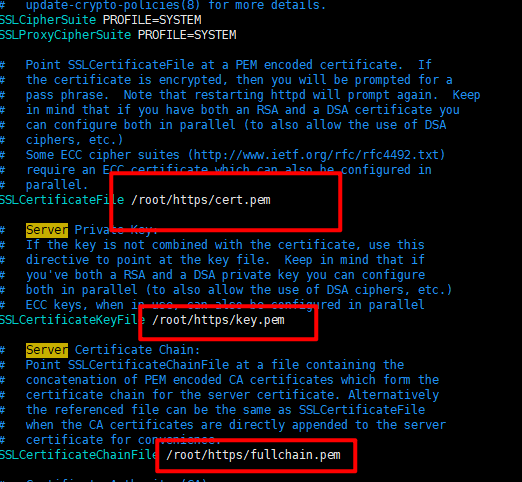我是用zerossl设置的,首先把默认服务商改成zerossl
acme.sh --set-default-ca --server zerossl
然后设置你的zerossl注册邮箱,不需要密码,设置之后可以在证书管理里看到你申请的证书
acme.sh --register-account -m 545821208@qq.com
acme.sh 还可以智能的从 apache的配置中自动完成验证, 不需要指定网站根目录:
acme.sh --issue -d liuchunjie.top --apache
安装证书,最好不要用生成证书的目录,自己创建个然后
acme.sh --install-cert -d liuchunjie.top \ --cert-file /root/https/cert.pem \ --key-file /root/https/key.pem \ --fullchain-file /root/https/fullchain.pem \ --reloadcmd "systemctl restart httpd"
首次安装需要手动修改ssl.conf
vim /etc/httpd/conf.d/ssl.conf
acme.sh 实现了 acme 协议, 可以从 letsencrypt 生成免费的证书.
主要步骤:
安装 acme.sh
生成证书
copy 证书到 nginx/apache 或者其他服务
更新证书
更新 acme.sh
出错怎么办, 如何调试
下面详细介绍.
1. 安装 acme.sh
安装很简单, 一个命令:
curl https://get.acme.sh | sh -s email=my@example.com
普通用户和 root 用户都可以安装使用. 安装过程进行了以下几步:
把 acme.sh 安装到你的 home 目录下:
~/.acme.sh/
并创建 一个 shell 的 alias, 例如 .bashrc,方便你的使用: alias acme.sh=~/.acme.sh/acme.sh
自动为你创建 cronjob, 每天 0:00 点自动检测所有的证书, 如果快过期了, 需要更新, 则会自动更新证书.
更高级的安装选项请参考: https://github.com/Neilpang/acme.sh/wiki/How-to-install
安装过程不会污染已有的系统任何功能和文件, 所有的修改都限制在安装目录中: ~/.acme.sh/
2. 生成证书
acme.sh 实现了 acme 协议支持的所有验证协议. 一般有两种方式验证: http 和 dns 验证.
1. http 方式需要在你的网站根目录下放置一个文件, 来验证你的域名所有权,完成验证. 然后就可以生成证书了.
acme.sh --issue -d mydomain.com -d www.mydomain.com --webroot /home/wwwroot/mydomain.com/
只需要指定域名, 并指定域名所在的网站根目录. acme.sh 会全自动的生成验证文件, 并放到网站的根目录, 然后自动完成验证. 最后会聪明的删除验证文件. 整个过程没有任何副作用.
如果你用的 apache服务器, acme.sh 还可以智能的从 apache的配置中自动完成验证, 你不需要指定网站根目录:
acme.sh --issue -d mydomain.com --apache
如果你用的 nginx服务器, 或者反代, acme.sh 还可以智能的从 nginx的配置中自动完成验证, 你不需要指定网站根目录:
acme.sh --issue -d mydomain.com --nginx
注意, 无论是 apache 还是 nginx 模式, acme.sh在完成验证之后, 会恢复到之前的状态, 都不会私自更改你本身的配置. 好处是你不用担心配置被搞坏, 也有一个缺点, 你需要自己配置 ssl 的配置, 否则只能成功生成证书, 你的网站还是无法访问https. 但是为了安全, 你还是自己手动改配置吧.
如果你还没有运行任何 web 服务, 80 端口是空闲的, 那么 acme.sh 还能假装自己是一个webserver, 临时听在80 端口, 完成验证:
acme.sh --issue -d mydomain.com --standalone
更高级的用法请参考: https://github.com/Neilpang/acme.sh/wiki/How-to-issue-a-cert
2. 手动 dns 方式, 手动在域名上添加一条 txt 解析记录, 验证域名所有权.
这种方式的好处是, 你不需要任何服务器, 不需要任何公网 ip, 只需要 dns 的解析记录即可完成验证. 坏处是,如果不同时配置 Automatic DNS API,使用这种方式 acme.sh 将无法自动更新证书,每次都需要手动再次重新解析验证域名所有权。
acme.sh --issue --dns -d mydomain.com \ --yes-I-know-dns-manual-mode-enough-go-ahead-please
然后, acme.sh 会生成相应的解析记录显示出来, 你只需要在你的域名管理面板中添加这条 txt 记录即可.
等待解析完成之后, 重新生成证书:
acme.sh --renew -d mydomain.com \ --yes-I-know-dns-manual-mode-enough-go-ahead-please
注意第二次这里用的是 --renew
dns 方式的真正强大之处在于可以使用域名解析商提供的 api 自动添加 txt 记录完成验证.
acme.sh 目前支持 cloudflare, dnspod, cloudxns, godaddy 以及 ovh 等数十种解析商的自动集成.
以 dnspod 为例, 你需要先登录到 dnspod 账号, 生成你的 api id 和 api key, 都是免费的. 然后:
export DP_Id="1234" export DP_Key="sADDsdasdgdsf" acme.sh --issue --dns dns_dp -d aa.com -d www.aa.com
证书就会自动生成了. 这里给出的 api id 和 api key 会被自动记录下来, 将来你在使用 dnspod api 的时候, 就不需要再次指定了. 直接生成就好了:
acme.sh --issue -d mydomain2.com --dns dns_dp
更详细的 api 用法: https://github.com/Neilpang/acme.sh/blob/master/dnsapi/README.md
3. copy/安装 证书
前面证书生成以后, 接下来需要把证书 copy 到真正需要用它的地方.
注意, 默认生成的证书都放在安装目录下: ~/.acme.sh/, 请不要直接使用此目录下的文件, 例如: 不要直接让 nginx/apache 的配置文件使用这下面的文件. 这里面的文件都是内部使用, 而且目录结构可能会变化.
正确的使用方法是使用 --install-cert 命令,并指定目标位置, 然后证书文件会被copy到相应的位置,
例如:
Apache example:
acme.sh --install-cert -d example.com \ --cert-file /path/to/certfile/in/apache/cert.pem \ --key-file /path/to/keyfile/in/apache/key.pem \ --fullchain-file /path/to/fullchain/certfile/apache/fullchain.pem \ --reloadcmd "service apache2 force-reload"
Nginx example:
acme.sh --install-cert -d example.com \ --key-file /path/to/keyfile/in/nginx/key.pem \ --fullchain-file /path/to/fullchain/nginx/cert.pem \ --reloadcmd "service nginx force-reload"
(一个小提醒, 这里用的是 service nginx force-reload, 不是 service nginx reload, 据测试, reload 并不会重新加载证书, 所以用的 force-reload)
Nginx 的配置 ssl_certificate 使用 /etc/nginx/ssl/fullchain.cer ,而非 /etc/nginx/ssl/<domain>.cer ,否则 SSL Labs 的测试会报 Chain issues Incomplete 错误。
--install-cert命令可以携带很多参数, 来指定目标文件. 并且可以指定 reloadcmd, 当证书更新以后, reloadcmd会被自动调用,让服务器生效.
详细参数请参考: https://github.com/Neilpang/acme.sh#3-install-the-issued-cert-to-apachenginx-etc
值得注意的是, 这里指定的所有参数都会被自动记录下来, 并在将来证书自动更新以后, 被再次自动调用.
4. 查看已安装证书信息
acme.sh --info -d example.com # 会输出如下内容: DOMAIN_CONF=/root/.acme.sh/example.com/example.com.conf Le_Domain=example.com Le_Alt=no Le_Webroot=dns_ali Le_PreHook= Le_PostHook= Le_RenewHook= Le_API=https://acme-v02.api.letsencrypt.org/directory Le_Keylength= Le_OrderFinalize=https://acme-v02.api.letsencrypt.org/acme/finalize/23xxxx150/781xxxx4310 Le_LinkOrder=https://acme-v02.api.letsencrypt.org/acme/order/233xxx150/781xxxx4310 Le_LinkCert=https://acme-v02.api.letsencrypt.org/acme/cert/04cbd28xxxxxx349ecaea8d07 Le_CertCreateTime=1649358725 Le_CertCreateTimeStr=Thu Apr 7 19:12:05 UTC 2022 Le_NextRenewTimeStr=Mon Jun 6 19:12:05 UTC 2022 Le_NextRenewTime=1654456325 Le_RealCertPath= Le_RealCACertPath= Le_RealKeyPath=/etc/acme/example.com/privkey.pem Le_ReloadCmd=service nginx force-reload Le_RealFullChainPath=/etc/acme/example.com/chain.pem
5. 更新证书
目前证书在 60 天以后会自动更新, 你无需任何操作. 今后有可能会缩短这个时间, 不过都是自动的, 你不用关心.
请确保 cronjob 正确安装, 看起来是类似这样的:
crontab -l 56 * * * * "/root/.acme.sh"/acme.sh --cron --home "/root/.acme.sh" > /dev/null
6. 关于修改ReloadCmd
目前修改ReloadCmd没有专门的命令,可以通过重新安装证书来实现修改reloadCmd的目的。
此外,安装证书后,相关信息是保存在~/.acme.sh/example.com/example.conf文件下的,内容就是acme.sh --info -d example.com输出的信息,不过ReloadCmd在文件中使用了Base64编码。理论上可以通过直接修改该文件来修改ReloadCmd,且修改时,无需Base64编码,直接写命令原文acme.sh也可以识别。
不过,example.conf文件的位置和内容格式以后可能会改变!example.conf一直都是内部使用, 后面有可能会改为用 sqlite 或者mysql 格式存储. 所以一般不建议自己修改。
7. 更新 acme.sh
目前由于 acme 协议和 letsencrypt CA 都在频繁的更新, 因此 acme.sh 也经常更新以保持同步.
升级 acme.sh 到最新版 :
acme.sh --upgrade
如果你不想手动升级, 可以开启自动升级:
acme.sh --upgrade --auto-upgrade
之后, acme.sh 就会自动保持更新了.
你也可以随时关闭自动更新:
acme.sh --upgrade --auto-upgrade 0
8. 出错怎么办:
如果出错, 请添加 debug log:
acme.sh --issue ..... --debug
或者:
acme.sh --issue ..... --debug 2



发表评论